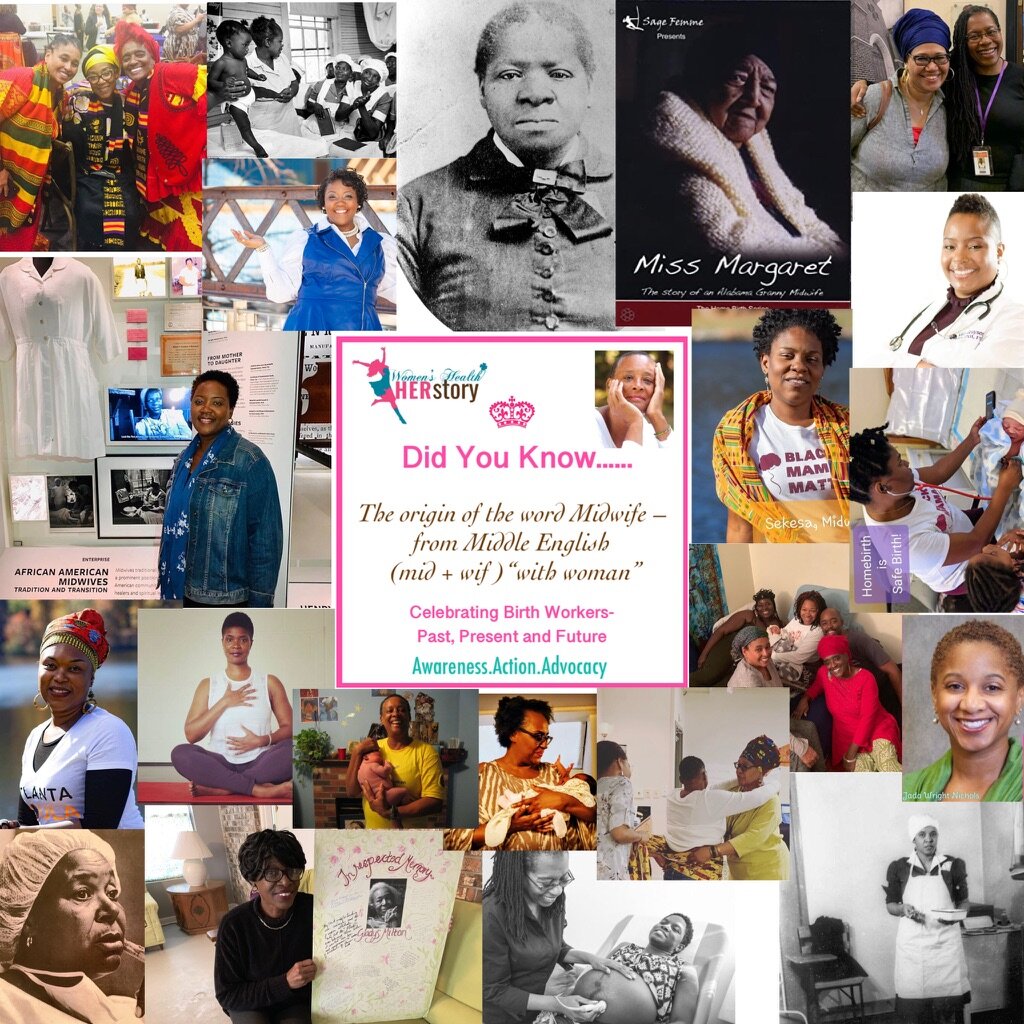Safe in their Hands and Heart-- Midwifery
In memory and honor of 🙏🏽Grand and Ancestor Midwives #ClaudiaBooker #MamieOdessaHale #MaudeCallen #MargaretCharlesSmith #GladysMilton #BridgetBiddyMason
In honor and memory of Grand Midwife – Claudia Booker “ …Black Midwives been resisting, leading, educating, supporting, catching and healing. Our presence may be new to you, but we ain’t new to this. We’ve been doing this for thousands of years. ~ Mama Claudia Booker
April is National Minority Health Month
Prior to 2016, the terms and concept of midwifery, doula and birthing assistant were not readily used in my vocabulary nor did I hear my fellow health care and scientific colleagues use them. It was was not until I hosted a teleforum entitled The Unfulfilled Womb- July 2016, experiencing the loss of colleagues and friend’s newborn babies, facilitating discussions around maternal health outcomes and volunteering with the first Black Maternal Health Conference in 2018 that I truly understood how invaluable the roles of birth workers are. I now know, love and appreciate them greatly. The World Health Organization has designated 2020 as the “International Year of the Nurse and the Midwife” to to strengthen of the nursing and midwifery workforce.
Did you Know?.... Over 50% of the births in the U.S. were attended by midwives and delivered at home before 1900. During this period (turn of the 20th century), many immigrants from the Eastern and Southern parts of Europe sought out midwives because they were accustomed to having one attend their births. Several highly respected scholars, birth workers and organizations have chronicled the history and impact of midwifery dating back to slavery in the U.S. They document the decline of the midwifery practice in the late 1800s/early 1900s due to the patriarchal rise of obstetrics, medical misogyny and the oppression and marginalization of midwives especially black midwives. The division and debate of homeopathic versus allopathic medicine and defamation of the traditional health and wellness practices also aided in the discrediting midwifery.
Today in the U.S. only 10% of births involve midwives but have alarmingly high incidence of maternal and infant mortality rates particularly African-Americans compared to industrialized countries like Canada, Sweden and the United Kingdom. The majority of the births in these countries are attended by midwives. Queen Mother of the Midwifery Movement and founder of, The International Center for Traditional Childbearing (ICTC), Mama Shafia Monroe stated "One of the darkest moments in US history was the systematic eradication of the African American midwife from her community, resulting in a legacy of birth injustices." African-American women in the United States are four times more likely than their white counterparts to die during pregnancy or childbirth and their infants are also twice as likely to die in their first year as white infants, and two to three times more likely to be born premature. Disparities are also seen in the Native American and Latina women.
Well-respected and world-renowned grand midwives like Mama Claudia, Mama Shafia, Mama Jennie Joseph and Mama Sarahn and new generation of black midwives are utilizing the traditions of their predecessors to normalize the birthing process to minimize the use of medical interventions for lower-risk births, improve maternity care and black maternal outcomes. They honor and listen to the birthing mother, provide culturally relevant and high quality care, are devoted to the training and empowerment of midwives and birth workers in the U.S. health care system. Master Midwife Jennie Joseph, founder of the JJ Way, has shown the effectiveness of her midwifery model of care which creates a culture and environment that supports all pregnant women by implementing patient-centered, holistic approaches regardless of socioeconomic background. Findings from a retrospective study compared women under the care of the JJ Way with other similar Florida women, revealed statically significant longer gestational periods and lower preterm birth rates for women of color (African-American, Haitian, Hispanic).
As the U.S. health care system is steadily trying to transform the landscape of maternal health by reducing disparities, improving patient outcomes, lowering health care costs, decreasing physician burn-out, increasing sustainable health care models and using integrated team approaches for service delivery, the need for midwives and other birth workers are critical. They are not only catching babies but they serve as the heartbeats of their communities, gatekeepers, trusted counselors, primary care providers, reproductive health advocates, social support workers, health navigators and champions.
References and Resources:
https://www.medpagetoday.com/nursing/nursing/85014
https://midwiferytoday.com/web-article/history-midwifery-childbirth-america-time-line/
https://undark.org/2019/04/17/midwives-birth-centers/
https://nursing.vanderbilt.edu/msn/pdf/nmw_midwiferyforAA.pdf
https://academicworks.cuny.edu/cgi/viewcontent.cgi?referer=https://www.google.com/&httpsredir=1&article=1422&context=gc_etds Birthing, Blackness, and the Body: Black Midwives and Experiential Continuities of Institutional Racism. Keisha L. Goode. CUNY Academic Works. 2014.
https://pdxscholar.library.pdx.edu/cgi/viewcontent.cgi?article=1182&context=honorstheses Specializing in Normal: An Overview of Midwifery in the US. Lucille Tower. Portland State University. 2015.
Improving Black Maternal Health Outcomes Through Holistic Midwifery Care - Black Maternal Health Week 2020 Webinar Series. Black Mamas Matter Alliance.
https://shafiamonroe.com/ending-black-u-s-maternal-mortality/
https://commonsensechildbirth.org/jjway/
Listen to Me Good The Story of a Alabama Midwife by Margaret Charles Smith and Linda Janet Holmes
When Birth Calls: Developing Your Inner Birth Worker by Traditional Midwife and Birth Justice Activist Sekesa Berry
Why Not Me? The story of Gladys Milton, midwife by Wendy Boward and Gladys Milton

